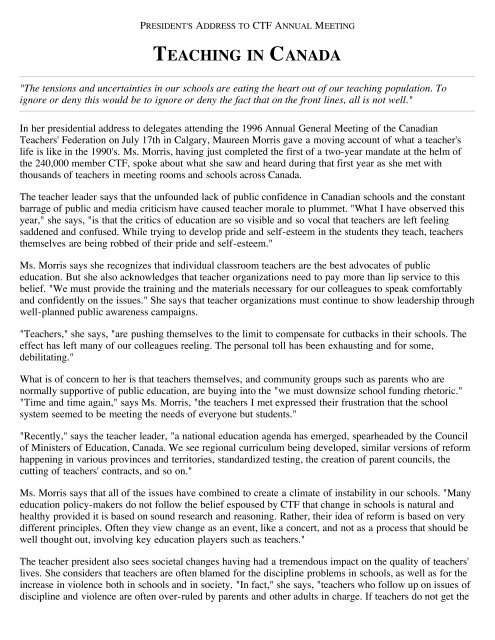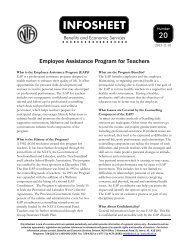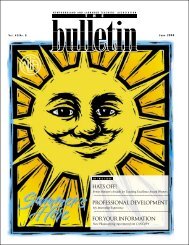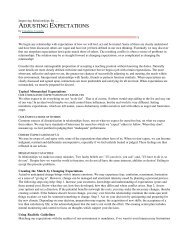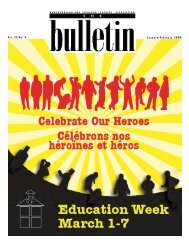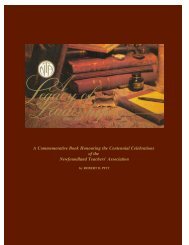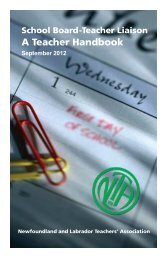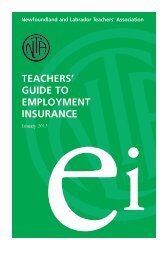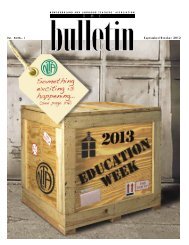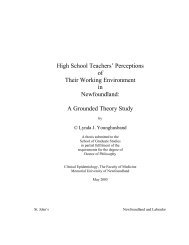The Bulletin, Vol. 40, No. 1 September/October 1996 from the NL ...
The Bulletin, Vol. 40, No. 1 September/October 1996 from the NL ...
The Bulletin, Vol. 40, No. 1 September/October 1996 from the NL ...
- No tags were found...
You also want an ePaper? Increase the reach of your titles
YUMPU automatically turns print PDFs into web optimized ePapers that Google loves.
PRESIDENT'S ADDRESS TO CTF ANNUAL MEETINGTEACHING IN CANADA"<strong>The</strong> tensions and uncertainties in our schools are eating <strong>the</strong> heart out of our teaching population. Toignore or deny this would be to ignore or deny <strong>the</strong> fact that on <strong>the</strong> front lines, all is not well."In her presidential address to delegates attending <strong>the</strong> <strong>1996</strong> Annual General Meeting of <strong>the</strong> CanadianTeachers' Federation on July 17th in Calgary, Maureen Morris gave a moving account of what a teacher'slife is like in <strong>the</strong> 1990's. Ms. Morris, having just completed <strong>the</strong> first of a two-year mandate at <strong>the</strong> helm of<strong>the</strong> 2<strong>40</strong>,000 member CTF, spoke about what she saw and heard during that first year as she met withthousands of teachers in meeting rooms and schools across Canada.<strong>The</strong> teacher leader says that <strong>the</strong> unfounded lack of public confidence in Canadian schools and <strong>the</strong> constantbarrage of public and media criticism have caused teacher morale to plummet. "What I have observed thisyear," she says, "is that <strong>the</strong> critics of education are so visible and so vocal that teachers are left feelingsaddened and confused. While trying to develop pride and self-esteem in <strong>the</strong> students <strong>the</strong>y teach, teachers<strong>the</strong>mselves are being robbed of <strong>the</strong>ir pride and self-esteem."Ms. Morris says she recognizes that individual classroom teachers are <strong>the</strong> best advocates of publiceducation. But she also acknowledges that teacher organizations need to pay more than lip service to thisbelief. "We must provide <strong>the</strong> training and <strong>the</strong> materials necessary for our colleagues to speak comfortablyand confidently on <strong>the</strong> issues." She says that teacher organizations must continue to show leadership throughwell-planned public awareness campaigns."Teachers," she says, "are pushing <strong>the</strong>mselves to <strong>the</strong> limit to compensate for cutbacks in <strong>the</strong>ir schools. <strong>The</strong>effect has left many of our colleagues reeling. <strong>The</strong> personal toll has been exhausting and for some,debilitating."What is of concern to her is that teachers <strong>the</strong>mselves, and community groups such as parents who arenormally supportive of public education, are buying into <strong>the</strong> "we must downsize school funding rhetoric.""Time and time again," says Ms. Morris, "<strong>the</strong> teachers I met expressed <strong>the</strong>ir frustration that <strong>the</strong> schoolsystem seemed to be meeting <strong>the</strong> needs of everyone but students.""Recently," says <strong>the</strong> teacher leader, "a national education agenda has emerged, spearheaded by <strong>the</strong> Councilof Ministers of Education, Canada. We see regional curriculum being developed, similar versions of reformhappening in various provinces and territories, standardized testing, <strong>the</strong> creation of parent councils, <strong>the</strong>cutting of teachers' contracts, and so on."Ms. Morris says that all of <strong>the</strong> issues have combined to create a climate of instability in our schools. "Manyeducation policy-makers do not follow <strong>the</strong> belief espoused by CTF that change in schools is natural andhealthy provided it is based on sound research and reasoning. Ra<strong>the</strong>r, <strong>the</strong>ir idea of reform is based on verydifferent principles. Often <strong>the</strong>y view change as an event, like a concert, and not as a process that should bewell thought out, involving key education players such as teachers."<strong>The</strong> teacher president also sees societal changes having had a tremendous impact on <strong>the</strong> quality of teachers'lives. She considers that teachers are often blamed for <strong>the</strong> discipline problems in schools, as well as for <strong>the</strong>increase in violence both in schools and in society. "In fact," she says, "teachers who follow up on issues ofdiscipline and violence are often over-ruled by parents and o<strong>the</strong>r adults in charge. If teachers do not get <strong>the</strong>


